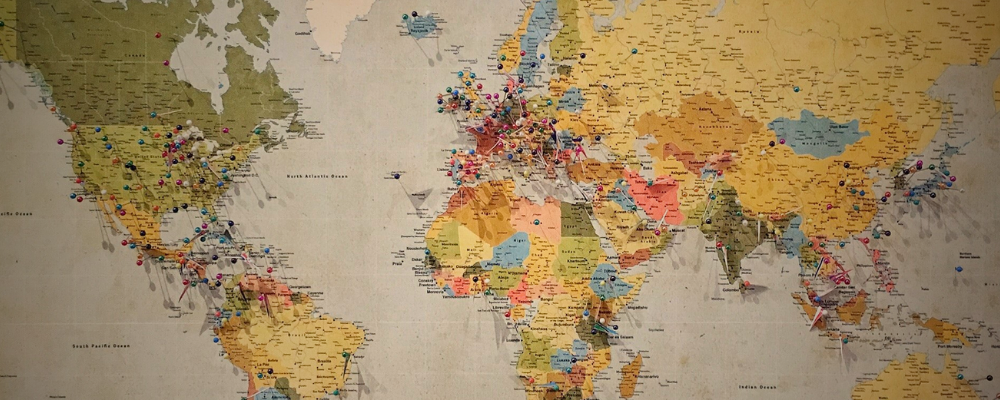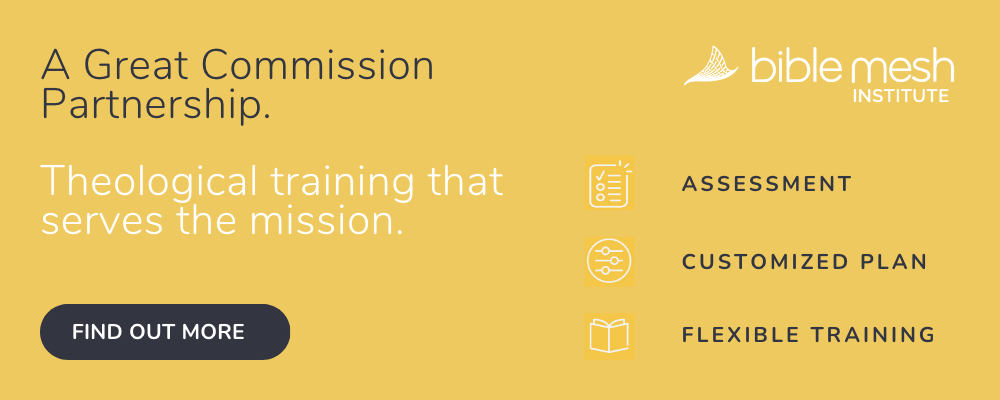In this series of blog posts, Dean of the BibleMesh Institute Dennis Greeson explores questions related to theological education and training for cross-cultural ministry. The questions and answers have been adapted from a Global Missions Podcast episode.
In this series, Dr. Greeson considers how to define the nature and task of theological education, especially for missionaries, considers common barriers to theological education, and looks at trends in how models for theological education are becoming more innovative and effective in preparing missionaries to join God’s work around the world.
Q. How do you see theological education enabling our mission servants who are going cross-culturally?
Let’s first look at the content in which we train missionaries before discussing BibleMesh’s particular approach to how we train missionaries to serve cross-culturally.
The Content of Theological Education
There are four essential categories to the BibleMesh Institute’s curriculum. Over a student’s time with us, we want to shape them in these areas. We seek to build these categories into all the courses and learning pathways.
1. Biblical Literacy
The first is biblical literacy. Theological education is all about knowing God. Knowing God means knowing him as he’s revealed himself to us in history in a way that transcends time through his written word, the Bible. One therefore can’t get away from the fact that theological education, first and foremost, is biblically-centered. This means we need to know what the Bible says and be able to understand what it means.
Many people come to BibleMesh to receive training in the Old and New Testament. Their previous formation, whether through Sunday School or even prior coursework, has taught them well about what the Bible says. They know the stories, the details, the Bible trivia, etc. But they lack the ability to put all the pieces together in a cohesive whole.
Knowing specific things that the Bible says here and there is not enough. One must understand what it says across the canon.
This is where we want to challenge people. Knowing specific things that the Bible says here and there is not enough. One must understand what it says across the canon. Across all sixty-six books of the Bible there is a unified message from the Lord. That takes time to learn. It requires certain skills of interpretation, knowledge of themes, and seeing how those themes resurface in various ways throughout the Old and New Testaments.
Given this, biblical literacy is the cornerstone of theological education.
2. Theological Formulation
The second is theological formulation. When students think about the task of theology, many are eager to skip straight to systematic theology: putting together summaries of what the Bible says about a given doctrine.
We urge a different approach, however, that seeks to let the Bible show us how to think theologically. We start with Scripture and its own internal theological emphases and organization.
The task of doing theology is not collecting little puzzle pieces of what Scripture says about this or that and trying to put them all together. Rather, one must step back and ask, in what way does the Bible speak about God and his work in history? How does what the Bible says and how it says it change the way I see the world, who God is in relation to it, and what it means for my life today? That’s the theological task.
3. Cultural Contextualization
Then we want to teach them how to apply that in a specific cultural context. Every individual lives in a particular time, place, and culture in history. God’s word speaks truly to us anytime, anywhere, and anyhow. Our understanding and application of it takes place within a particular cultural setting.
We want to therefore give people the skills to interpret scripture and apply it well to a cultural context. This is not just the missionary task; it is the task of being a Christian. Each of us finds ourselves embedded in a cultural context that affects how we approach and interpret scripture. Every Christian therefore needs to develop not only the skills to read scripture, but also read their culture.
Especially important for the missionary who takes the gospel across cultural divides. We teach students how to interpret and apply scripture theologically within a specific culture.
4. Missiological Multiplication
Finally, BibleMesh wants to see students multiply. Missions is all about spreading, teaching others, proclaiming what God has done, and equipping others to do the same. Missiological multiplication is an essential component to any successful approach to theological education. We can’t just teach students how to read and interpret the Bible for themselves, but we also need to train them in how to teach it to others and launch them into the world to participate in God’s global work.
Those are the four essentials missionaries need to be trained in, whether through our program or another.
Our Approach To Theological Education
There is an opportunity today to re-imagine the approach to theological education. In the early church, this training was always church based. There were no seminaries. Churches were ground zero for teaching and making disciples.
There is an opportunity today to re-imagine the approach to theological education.
That has shifted towards institutions throughout church history. In the last 30 to 40 years, training has been very focused on institutions—seminaries or Bible colleges. When my parents first decided to become missionaries, they knew seminary was the next step. I had the same mentality (I too went to seminary).
We are no longer tied to that model. Recently there have been shifts in how churches think about training. The church based model is becoming more popular. Churches are taking on training programs for their ministers, pastors, and missionaries.
Mission agencies are beginning to provide in-house, and they’re doing it well. Networks or groups of collaborating churches (such as The Gospel Coalition or Acts 29, groups we might consider as a new generation of denominations not defined by theological distinctives but as associations of churches) are training their own people rather than sending them to seminaries or colleges.
Finally, there are hybrid organizations like BibleMesh who want to get into every stage of all those models and help make them better. The fact that all these different options exist is exciting. It means new opportunities to explore what works best in a given context.
Q. In addition to time and money, what other barriers do you see for missionaries seeking theological training?
Perhaps one of the big ones is trustworthiness. One of the requirements of a reputable institution is having some sort of accreditation. This means students can trust that the institution is committed to training people in the way that they have said they would.
But when you get to online training with organizations, the issue of trustworthiness rears its head. Does this organization do what they say they do? Can we actually trust that they are effectively training individuals for ministry and the Christian life?
This also includes theological trustworthiness—can one trust the beliefs that are driving a group or organization? Does this organization believe in the historic, orthodox faith “once delivered to the saints” and handed down through the ecumenical church councils of the early church? Do they have a high view of the inerrancy and authority of scripture?
Does this organization believe in the historic, orthodox faith “once delivered to the saints” and handed down through the ecumenical church councils of the early church?
Second, even if you can trust what an organization or institution will teach students, you need to ask if you can trust how they will teach those students. This is the barrier of format.
The classroom model, with three-credit hour, one semester classes has been the model of education for hundreds of years. This model continues to be helpful.
But serving missionaries well requires one to recognize that, for better or for worse, the traditional format is a barrier for some. Regardless of whether this is based on perception that this a traditional education will slow someone down from getting to the field or that the classroom isolates one from the laboratory—the place where you practice the necessary skills for effective ministry—it points to the need to get creative with how we’re teaching students.
There’s an imperative to reimagine the format and the model of training today. Those who are innovating in this area see a need for forming students through cohort-based experiences, practical ministry application, flexible course structures, and leveraging technology to make learning pathways accessible to students in different places and life situations.
This ends part 2 of our four part series on How Should Missionaries and Mission Agencies Think About Theological Education?
Dr. Dennis Greeson is Dean of the BibleMesh Institute and Research Fellow in Public Theology for The Land Center for Cultural Engagement. He is also a PhD Research supervisor at Union Theological College, Belfast, and teaches and writes on theology, culture, and public square issues.

